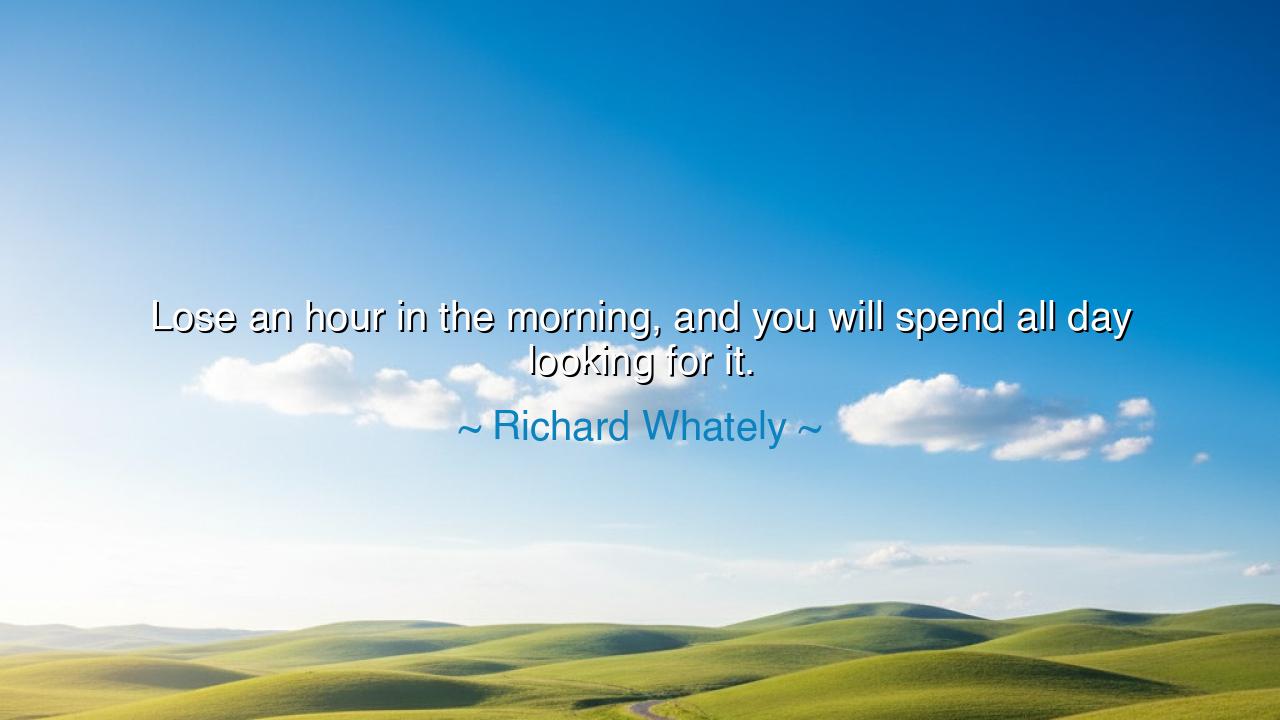
Lose an hour in the morning, and you will spend all day looking






Richard Whately, the wise archbishop and scholar, gave us this timeless warning: “Lose an hour in the morning, and you will spend all day looking for it.” Though simple in sound, it is as sharp as a sword cutting through the illusions of idleness. Whately speaks not only of the hours upon the clock, but of the deeper truth that what is lost in the beginning cannot easily be restored at the end. The morning, the first breath of the day, is the seedbed of destiny. To squander it is to weaken the whole harvest.
For the morning is not like other hours. It is the foundation upon which the day is built, the spring from which the river of action flows. If the spring is muddied at its source, the river downstream will not run clear. The ancients knew this well. The Roman legions began their marches at dawn, rising with discipline to prepare for conquest. The philosopher, the poet, the farmer—all greeted the first light with reverence. To them, the morning was sacred, the hour of beginnings, and they guarded it with diligence.
Whately’s wisdom reminds us that time, once lost, cannot be reclaimed. If a man wastes the early hour in slumber, in distraction, in carelessness, the tasks of the day scatter like leaves in the wind. He chases after them endlessly, never catching up. But the one who seizes the morning seizes the day entire. An hour gained at dawn is worth ten at dusk. This is not mere proverb—it is a law of life.
History gives us examples of this truth. Consider Benjamin Franklin, who famously declared, “Early to bed and early to rise makes a man healthy, wealthy, and wise.” Franklin’s mornings were filled with planning, reflection, and study. By the time others stirred, his mind was already sharpened, his spirit already lifted. The fruits of his industry—his inventions, his statesmanship, his writings—were all born from his devotion to the power of morning. Had he wasted those hours, the world may never have known the lightning rod, the library, or the statesman who helped shape a nation.
But the lesson is not only for great men of history; it is for every soul. The student who rises early to prepare finds clarity, while the one who sleeps too long stumbles through confusion. The worker who greets the dawn with readiness carries strength, while the one who lingers in idleness spends the day chasing shadows. The hour lost cannot be reclaimed, for time is merciless in its march. It does not return what we waste; it only reminds us of what could have been.
Yet within Whately’s words there is also a call to hope. If the morning is so powerful, then each new dawn is a chance for renewal. No matter how many hours we have lost in the past, the rising sun offers us the opportunity to begin again. The chains of yesterday’s sloth can be broken by today’s discipline. The sweetness of victory belongs to those who seize the gift of the morning.
Therefore, let this be the teaching: guard the morning as you would guard treasure. Rise with purpose, shape the first hour with clarity and intention, and you will command the day that follows. Do not give it to distraction, to laziness, to folly, for once it slips away you will spend the rest of the day searching in vain. But if you master the morning, you will master yourself, and in mastering yourself, you will master life.
For in the end, Whately’s wisdom is eternal: he who wastes the dawn weakens the day, but he who honors it strengthens his destiny. Thus, children of tomorrow, hold fast to your mornings, and let them be the forge upon which your greatness is made.






AAdministratorAdministrator
Welcome, honored guests. Please leave a comment, we will respond soon